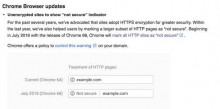Chromium-Based Microsoft Edge Added to Windows 10 Sandbox
With Windows enthusiasts awaiting the public release of the Chromium-based Microsoft Edge browser, Microsoft reportedly made it available in an unlikely place. According to reports, some users of Windows 10 Insider build 18865 have found that Microsoft is testing the Edge Insider build withing the Windows Sandbox feature.











































































